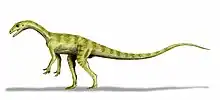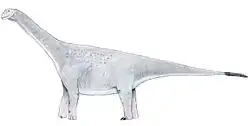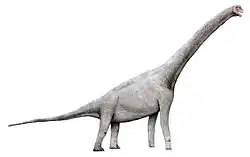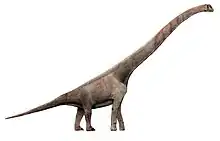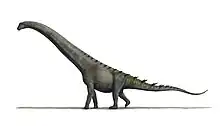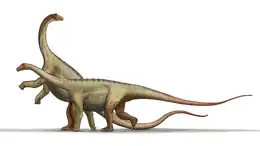Tengrisaurus
Tengrisaurus (meaning "Tengri lizard") is a genus of lithostrotian sauropod, from the Early Cretaceous (Barremian-Aptian) Murtoi Formation, Russia. It was described in 2017 by Averianov & Skutschas. The type species is T. starkovi.[1] New remains were described in 2021 by Averianov, Sizov & Skutschas.[2]
| Tengrisaurus | |
|---|---|
| Scientific classification | |
| Domain: | Eukaryota |
| Kingdom: | Animalia |
| Phylum: | Chordata |
| Clade: | Dinosauria |
| Clade: | Saurischia |
| Clade: | †Sauropodomorpha |
| Clade: | †Sauropoda |
| Clade: | †Macronaria |
| Clade: | †Titanosauria |
| Clade: | †Lithostrotia |
| Genus: | †Tengrisaurus Averianov & Skutschas, 2017 |
| Type species | |
| †Tengrisaurus starkovi Averianov & Skutschas, 2017 | |
Description
Tengrisaurus starkovi is based on three caudal vertebrae. The genus is characterized by strongly procoelous anterior and middle caudal vertebrae, with strongly developed pre-epipophyses, highly pneumatic neural spine, and solid bone structure of the centrum.[1]
Classification
Amerianov and Efimov (2018) recovered Tengrisaurus as a lithostrotian titanosaur. They found Lithostrotia to be divided into two main lineages, one containing Saltasauridae, the other containing Lognkosauria, with Tengrisaurus belonging to the former. The following cladogram follows their analysis.[3]
| Lithostrotia |
| ||||||||||||||||||||||||||||||||||||||||||||||||||||||||||||
References
- Averianov, A.; Skutschas, P. (2017). "A new lithostrotian titanosaur (Dinosauria, Sauropoda) from the Early Cretaceous of Transbaikalia, Russia". Biological Communications. 62 (1): 6–18. doi:10.21638/11701/spbu03.2017.102.
- Averianov, A. O.; Sizov, A. V.; Skutschas, P. P. (2021). "Gondwanan affinities of Tengrisaurus, Early Cretaceous titanosaur from Transbaikalia, Russia (Dinosauria, Sauropoda)". Cretaceous Research. 122: Article 104731. doi:10.1016/j.cretres.2020.104731. S2CID 233539964.
- Averianov, Alexander; Efimov, Vladimir (2018). "The oldest titanosaurian sauropod of the Northern Hemisphere". Biological Communications. 63 (6): 145–162. doi:10.21638/spbu03.2018.301.
